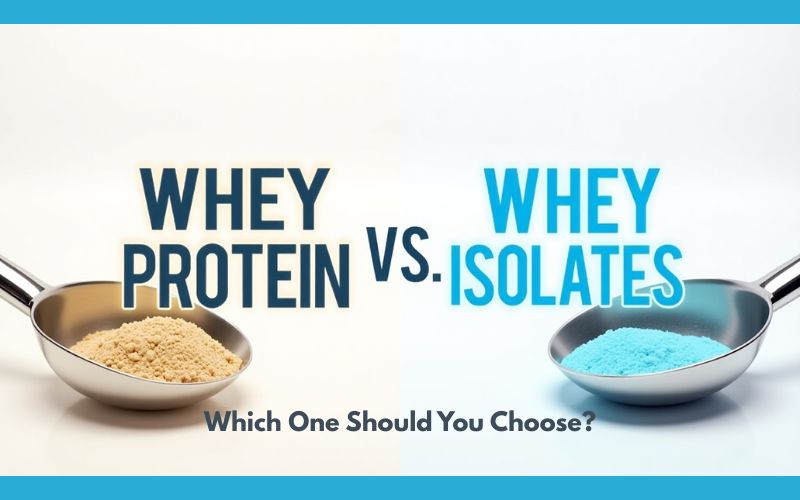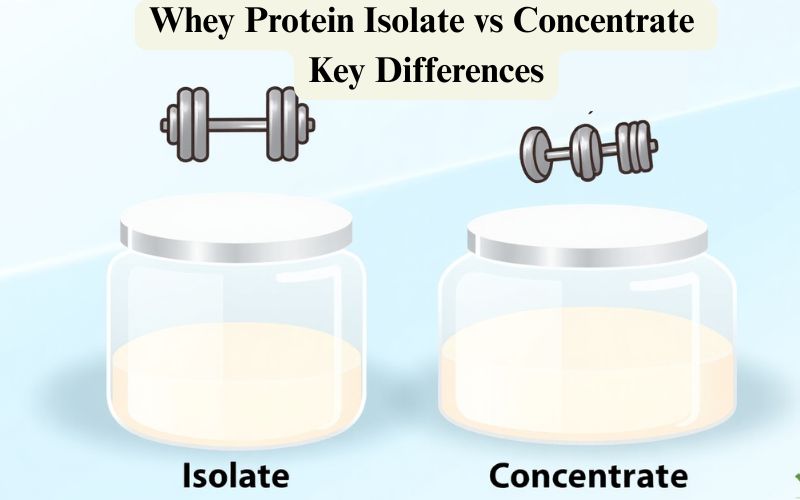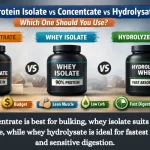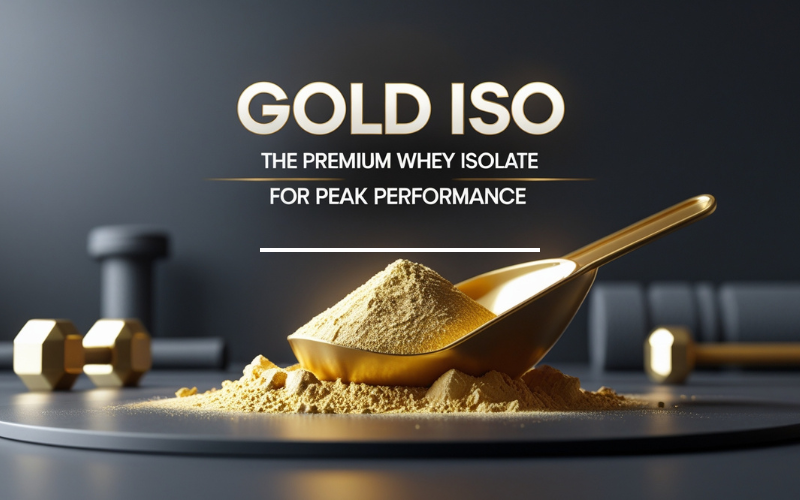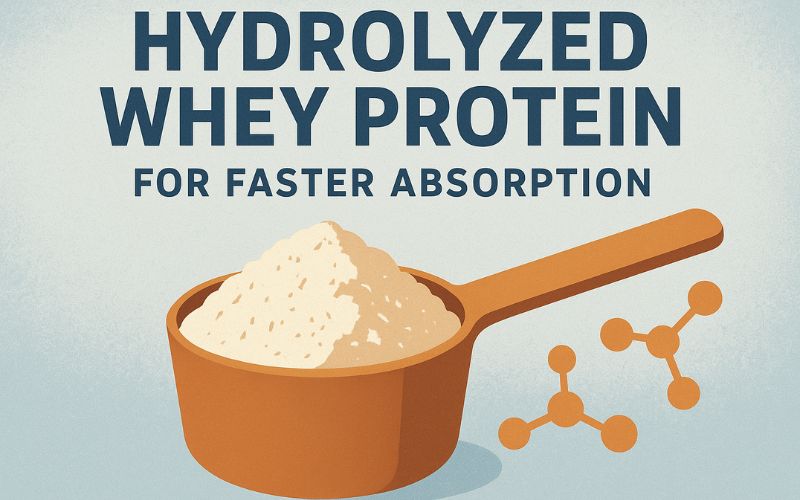For athletes managing lactose sensitivity, the journey toward optimal performance often begins with nutrition and for many, the wrong protein powder can do more harm than good. While whey protein is a gold standard for muscle recovery, traditional forms like whey concentrate can cause bloating, discomfort, and even derail training consistency in lactose-sensitive individuals.
Finding a protein powder that fuels performance without upsetting the digestive system is crucial, and that’s where whey protein isolate comes in.
Table of Contents
Understanding Whey Protein Isolate vs Concentrate
The difference between whey concentrate and isolate lies primarily in their filtration process and lactose content. Whey concentrate contains around 70–80% protein, but also retains a fair amount of lactose, fat, and carbs. On the other hand, whey isolate is more heavily filtered, resulting in a protein content of around 90% or more, with most of the lactose and fat removed.
This difference makes isolate a better option for those with lactose intolerance or mild sensitivity. It delivers the same amino acid profile and muscle-building benefits—minus the digestive side effects.
Benefits of Whey Isolate for Sensitive Digestive Systems
Digestive comfort is non-negotiable for serious athletes.
- Whey isolate stands out for its light, fast-digesting properties, making it ideal for sensitive systems.
- By removing most of the lactose and fat, whey isolate reduces the chances of bloating, gas, and cramps. This is especially helpful post-workout when the body’s digestive system is more sensitive.
- Additionally, its rapid absorption ensures amino acids reach muscles quickly—just when they’re needed most.
- Whey isolate also tends to mix more smoothly and doesn’t leave the thick, gritty texture often found in other powders, which makes it easier to enjoy daily.
Key Features That Make the Right Isolate Stand Out
When choosing a whey isolate protein, not all options are created equal. It’s important to look beyond the label and focus on what truly supports athletic performance and sensitive digestion.
The ideal isolate should offer at least 25 grams of protein per serving, with near-zero sugar, low carbs, and minimal fat. Added ingredients like MCTs (medium-chain triglycerides) or fiber may support gut health and energy delivery. Some isolates also feature flavor-enhancing ingredients that avoid artificial sweeteners or lactose-based creamers.
Look for a protein that is third-party tested, free from banned substances, and lists clear ingredient sources—especially if you’re training competitively.
How Proper Whey Isolate Supports Muscle Growth and Recovery
Muscle recovery is where protein really proves its worth. For athletes with lactose sensitivity, using the right isolate ensures they’re not compromising gains for the sake of comfort.
Whey isolate contains all nine essential amino acids, including high levels of leucine—a key trigger of muscle protein synthesis. It’s also rich in branched-chain amino acids (BCAAs), which help reduce muscle breakdown during workouts and speed up repair afterward.
Because it absorbs faster than other forms of protein, isolate delivers nutrients at the optimal time—within that crucial post-workout anabolic window.
Everyday Usage Tips for Lactose-Sensitive Athletes
Adding whey isolate to your routine doesn’t need to be complicated. The key is consistency and proper timing.
For best results, consume a scoop of whey isolate within 30 minutes post-workout. It can also be used as a breakfast protein boost or as a snack between meals to curb cravings. Mixing it with water is ideal for fast absorption, but if you prefer creaminess, go for lactose-free milk or unsweetened almond milk.
Stick to 1–2 scoops per day depending on your activity level and overall protein intake from whole foods. Always monitor how your body responds and adjust timing if needed.
Real Benefit Highlights of the Recommended Isolate Option
For athletes seeking a gentle yet powerful protein source, one particular product stands out: Nutrex Research ISOFIT Whey Protein Isolate. It’s designed with the needs of lactose-sensitive users in mind featuring a 100% isolate formula, zero added sugars, and a gluten-free profile.
Beyond its clean label, ISOFIT also includes a gourmet flavor system that makes it easier to stick to your supplement routine. Users often praise its light texture and smooth mixability—two things that make a big difference when consuming protein regularly.
Its formulation is based on cold-processed, ultra-filtered whey isolate that retains high-quality protein content without residual lactose. This makes it an excellent choice for those who want the benefits of whey without the digestive compromise.
Common Myths and Misconceptions
There’s a lot of confusion around protein and digestion especially when it comes to whey. It’s important to clear up a few myths so athletes can make informed choices.
- One common misconception is that all whey proteins contain lactose. While this is true for whey concentrate, whey isolate is typically over 90% lactose-free.
- Another myth is that any protein powder will upset your stomach—when in fact, issues often come from added fillers, poor-quality processing, or excessive lactose.
- And while plant-based proteins are sometimes viewed as the only “safe” option for sensitive stomachs, they often fall short on amino acid completeness and muscle-building efficacy.
Who Should Use This Isolate And Who Might Need Alternatives?
Whey isolate isn’t just for lactose-intolerant individuals. It’s great for anyone looking for clean, efficient protein supplementation with fast absorption and minimal digestive burden.
This includes endurance athletes, weightlifters, CrossFitters, and even casual gym-goers who want to stay lean and feel good after training. However, those with a diagnosed dairy allergy not just lactose sensitivity—may still need to explore non-dairy alternatives, as even isolates may contain trace amounts of dairy proteins.
Conclusion
When every gram of protein matters and every rep counts, athletes can’t afford to deal with bloating, cramps, or poor digestion. Whey isolate offers a smart, scientifically supported alternative that delivers muscle-supporting amino acids without the discomfort.
By choosing a clean, lactose-free protein isolate like Nutrex Research ISOFIT, athletes can fuel their performance confidently knowing their supplement works with their body, not against it.















